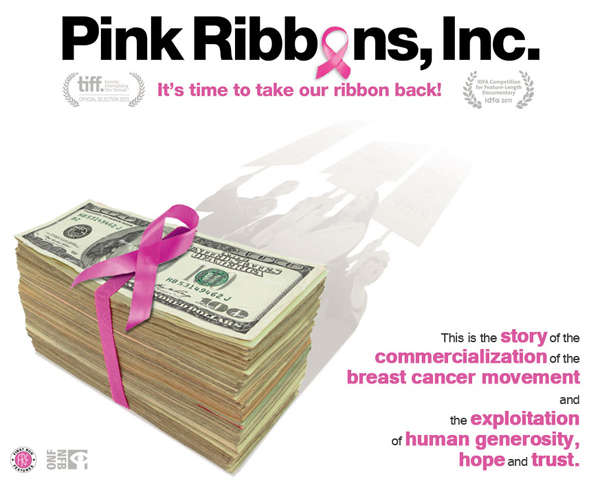Many people have been affected by ‘the Big C’ (i.e. cancer). My father was diagnosed with Stage One mouth cancer last year and I had to face the possibility, though rather low, that he would not live much longer. In 2009, my aunt was diagnosed with stage 4 Pancreatic Cancer and her painful death six months later still haunted my family when my father revealed his diagnosis. It’s a touchy subject. With all of this on my mind, a documentary such as “Pink Ribbon, Inc.” will surely stir passions with cancer victims, survivors, and their loved ones. Likewise, it isn’t shocking that a cancer documentary is performing terribly at the box office to the tune of $17,000 TOTAL! It opened in Denver this weekend only to leave before this upcoming weekend.
A breast cancer documentary wont draw women in like “Magic Mike” will, but a film like “Pink Ribbon, Inc.” is something many women owe it to themselves to watch. It brings up tough subject matter with personal testimony, knowledgeable talking heads, statistics as well as footage of women walking for the cure. But the film would turn people off when someone like Judy Brady states that when she sees a pink ribbon “I see evil.” One pundit made a strong point when some cancer survivors think this branding is terrible. Some “resent the effort to make it pretty, feminine, and normal. Its horrible and it needs to be stopped.”
You know a documentary like “Pink Ribbon, Inc.” poses a radical premise when it receives a virtual media black out. This isn’t the cuddly mainstream message posed in “Bully.” For all the subject matters it discusses, very few media outlets and critics even mentioned it. This critiques a method of an organization that many individuals respect and puts people in a tough position. Like last years Oscar nominated documentary “If a Tree Falls” ‘Pink Ribbons’ is a one sided, fringe documentary which asks thought provoking questions placing viewers in an uncomfortable position.
“Pink Ribbon, Inc.” makes a solid case that company’s motivations is all about marketing cancer and not curing it. If all that money used for marketing was used for research and prevention, then most likely significant progress could be made on possibly finding a cure. One outrageous claim to some, but worth serious consideration is the motivations behind the NFL to promote breast cancer awareness. “Pink Ribbons” mentions before the NFL adapted this sponsorship, some NFL players were caught in controversy involving domestic abuse. According to the film, the organization realized this could harm their brand and wanted to reach out to their female audience. Supporting cancer is good PR and so is seeing football players wearing pink as they do every October.
The strongest argument is when the documentary accuses certain companies of supporting cancer research only to manufacture products that contain cancer-causing chemicals. That’s a valid point.
As cancer consumes effects lives and awareness consumes are culture, many people need to be aware of the causes and the need for a cure. A documentary like “Pink Ribbon Inc.” deserves to be apart of that same conversation.
























